新目标英语九年级Units 1-5复习课件
文档属性
| 名称 | 新目标英语九年级Units 1-5复习课件 |

|
|
| 格式 | zip | ||
| 文件大小 | 154.6KB | ||
| 资源类型 | 教案 | ||
| 版本资源 | 人教新目标(Go for it)版 | ||
| 科目 | 英语 | ||
| 更新时间 | 2012-03-26 00:00:00 | ||
图片预览

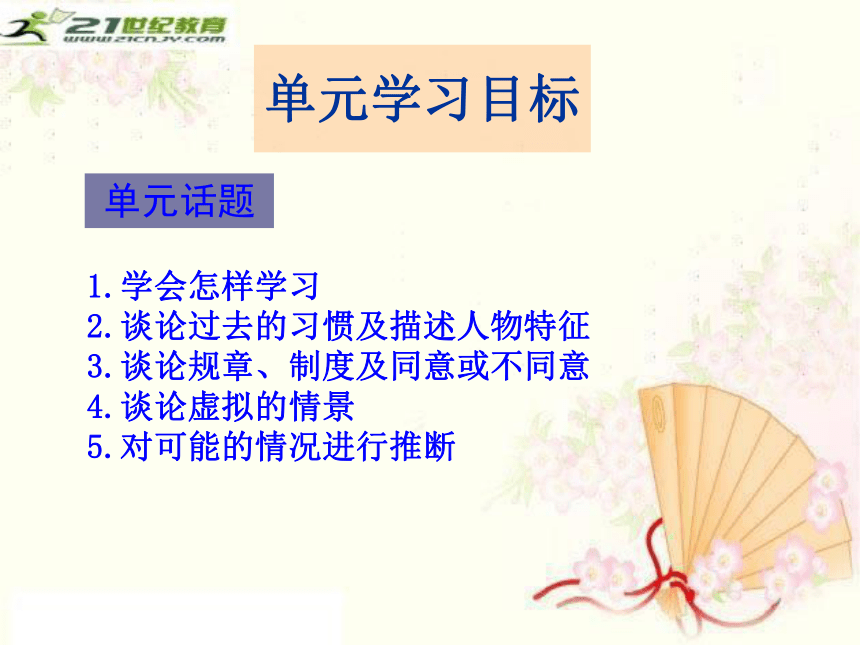
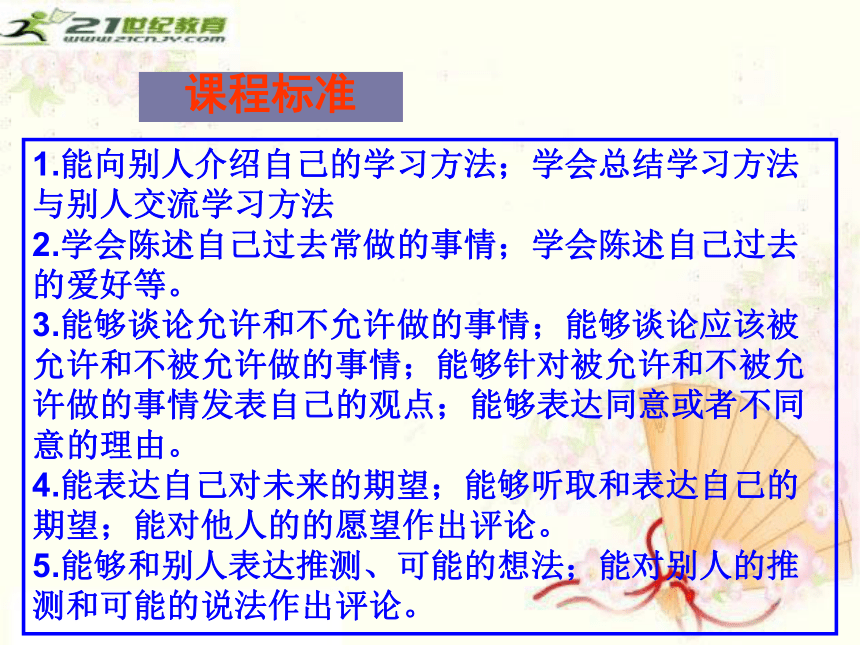
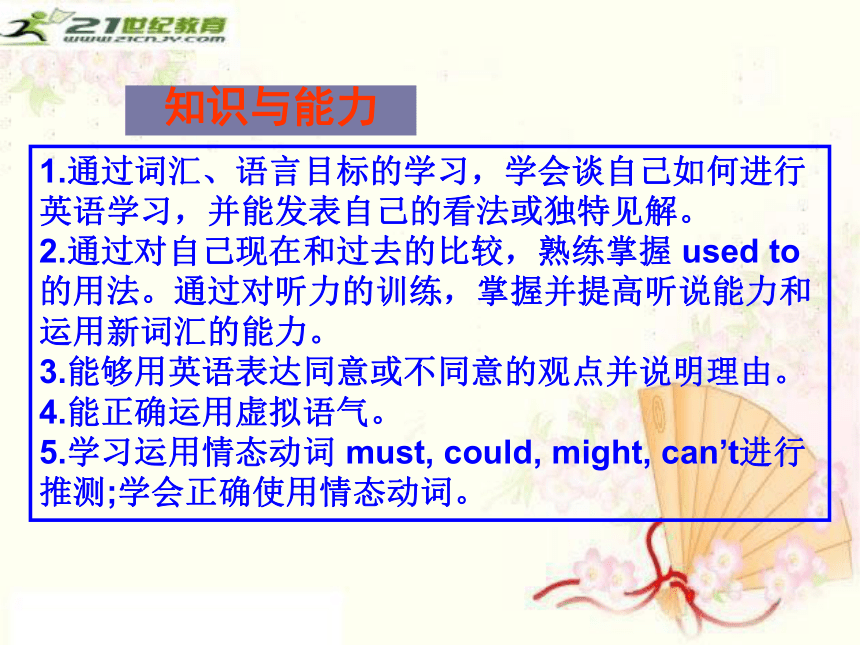
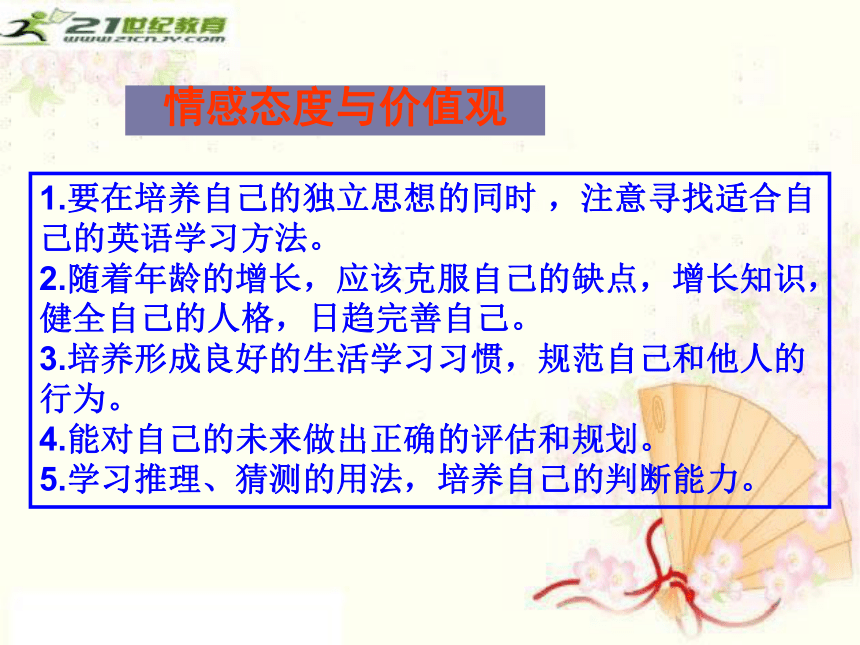
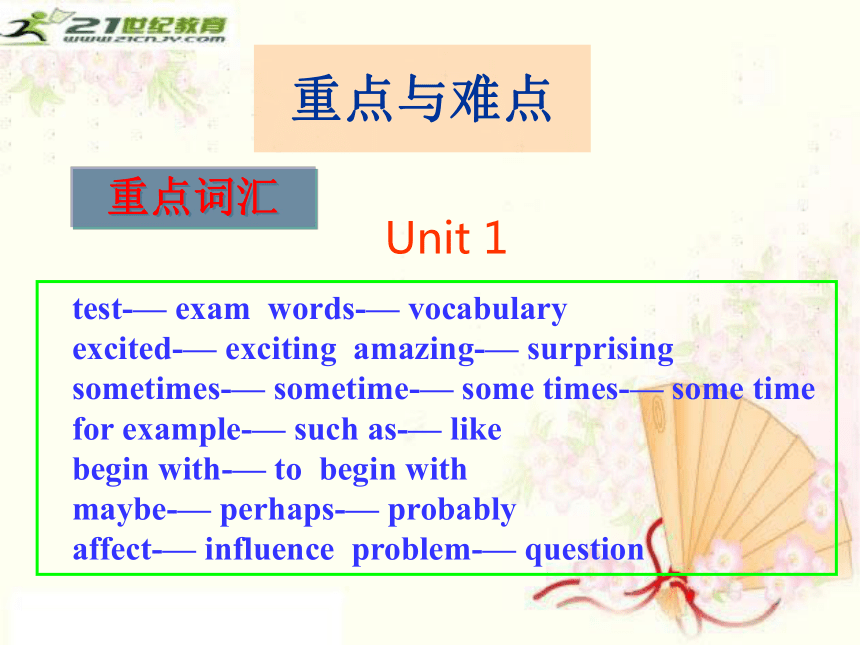

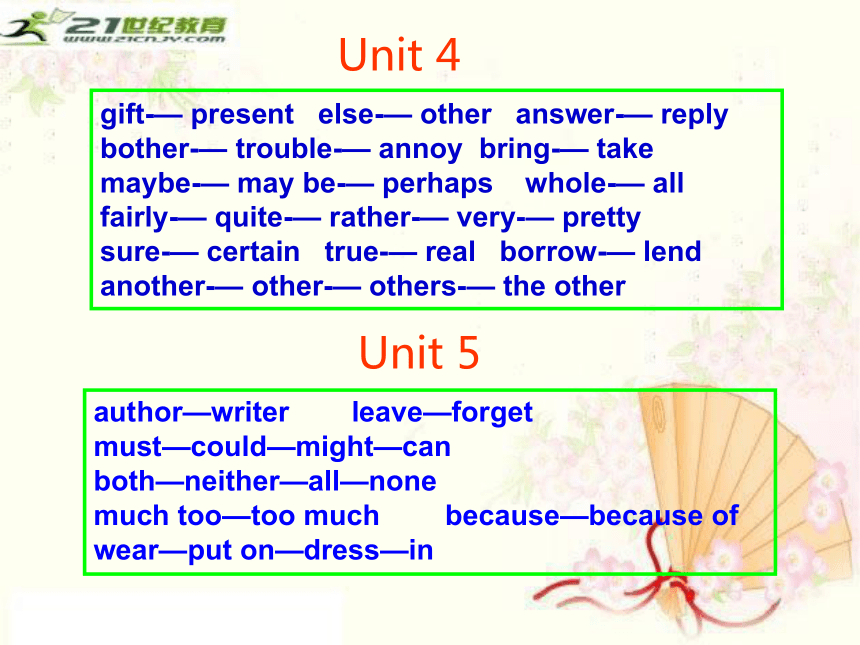
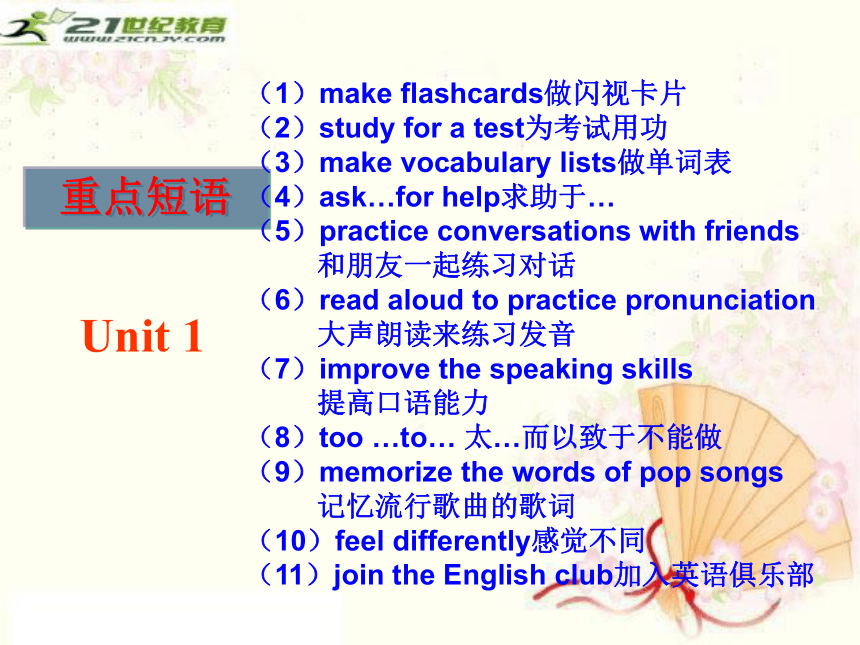
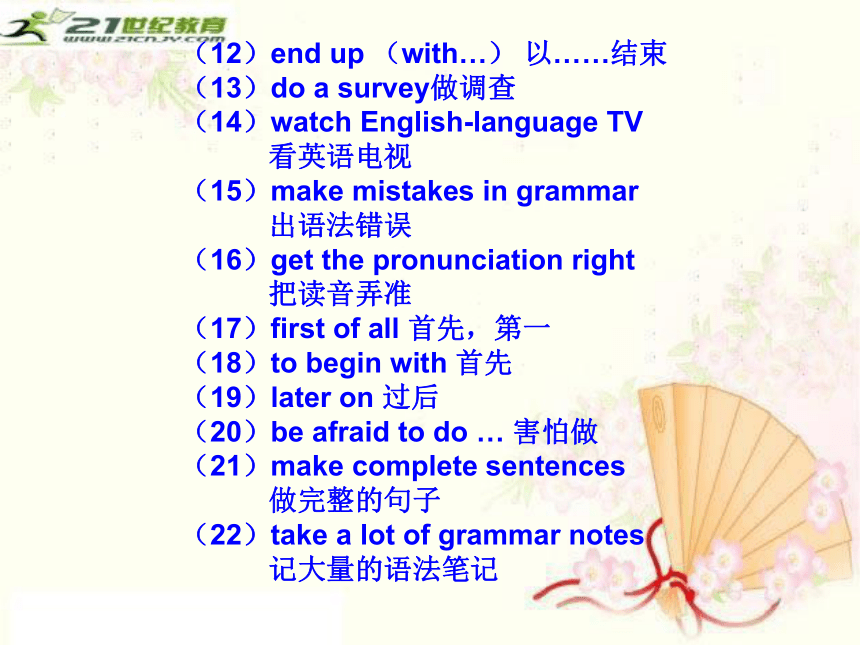
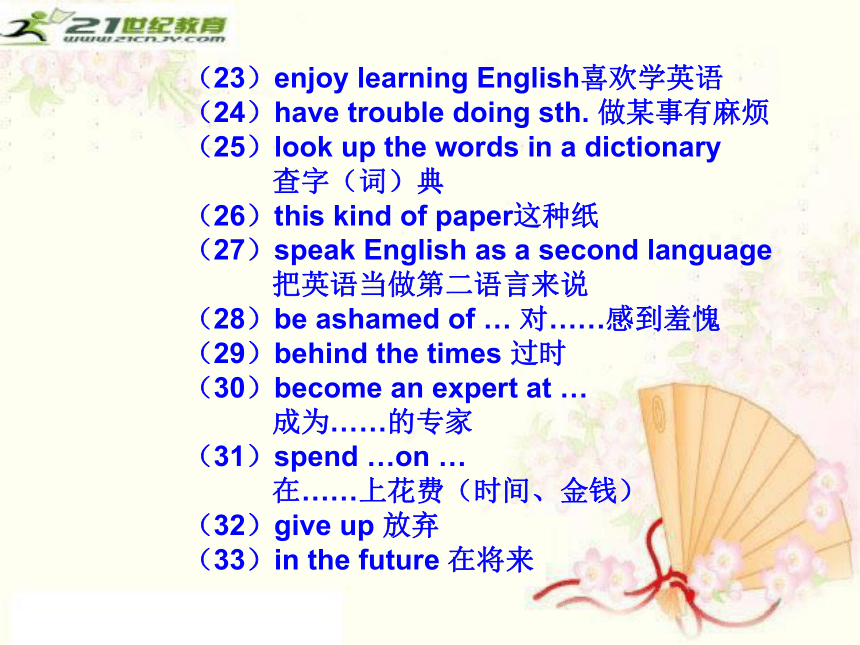
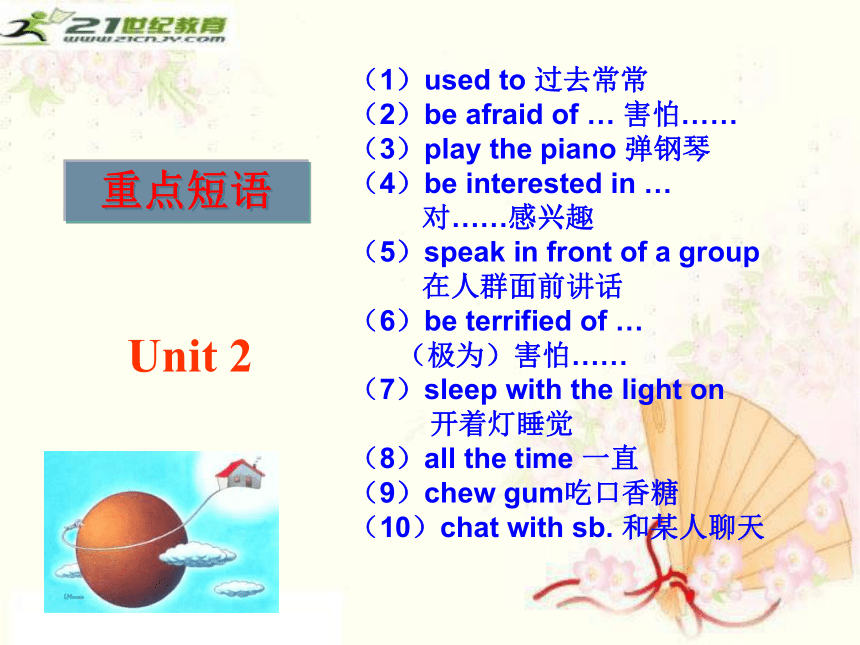
文档简介
(共31张PPT)
Review of Units 1-5
单元课文
Unit 1 How do you study for a test Unit 2 I used to be afraid of the dark. Unit 3 Teenagers should be allowed to
choose their own clothes. Unit 4 What would you do Unit 5 It must belong to Carla.
单元学习目标
1.学会怎样学习 2.谈论过去的习惯及描述人物特征 3.谈论规章、制度及同意或不同意 4.谈论虚拟的情景 5.对可能的情况进行推断
单元话题
课程标准
1.能向别人介绍自己的学习方法;学会总结学习方法与别人交流学习方法
2.学会陈述自己过去常做的事情;学会陈述自己过去的爱好等。
3.能够谈论允许和不允许做的事情;能够谈论应该被允许和不被允许做的事情;能够针对被允许和不被允许做的事情发表自己的观点;能够表达同意或者不同意的理由。
4.能表达自己对未来的期望;能够听取和表达自己的期望;能对他人的的愿望作出评论。
5.能够和别人表达推测、可能的想法;能对别人的推测和可能的说法作出评论。
知识与能力
1.通过词汇、语言目标的学习,学会谈自己如何进行英语学习,并能发表自己的看法或独特见解。
2.通过对自己现在和过去的比较,熟练掌握 used to 的用法。通过对听力的训练,掌握并提高听说能力和运用新词汇的能力。
3.能够用英语表达同意或不同意的观点并说明理由。
4.能正确运用虚拟语气。
5.学习运用情态动词 must, could, might, can’t进行推测;学会正确使用情态动词。
情感态度与价值观
1.要在培养自己的独立思想的同时 ,注意寻找适合自己的英语学习方法。
2.随着年龄的增长,应该克服自己的缺点,增长知识,健全自己的人格,日趋完善自己。
3.培养形成良好的生活学习习惯,规范自己和他人的行为。
4.能对自己的未来做出正确的评估和规划。
5.学习推理、猜测的用法,培养自己的判断能力。
重点与难点
重点词汇
test — exam words — vocabulary
excited — exciting amazing — surprising
sometimes — sometime — some times — some time
for example — such as — like
begin with — to begin with
maybe — perhaps — probably
affect — influence problem — question
Unit 1
Unit 2
be afraid of — be afraid to used to —be used to
alone — along — hardly — almost — nearly
unluckily — unfortunately no longer — no more
though — although — even though
finally — at last — in the end
Unit 3
let — allow wear — put on — dress — in
daily — every day — every day
noise — noisy — sound — voice
reply — answer every one — everyone
few — a few — little — a little
chance — opportunity complete — finish
Unit 4
gift — present else — other answer — reply
bother — trouble — annoy bring — take
maybe — may be — perhaps whole — all
fairly — quite — rather — very — pretty
sure — certain true — real borrow — lend
another — other — others — the other
Unit 5
author—writer leave—forget
must—could—might—can
both—neither—all—none
much too—too much because—because of
wear—put on—dress—in
重点短语
(1)make flashcards做闪视卡片 (2)study for a test为考试用功 (3)make vocabulary lists做单词表 (4)ask…for help求助于… (5)practice conversations with friends
和朋友一起练习对话 (6)read aloud to practice pronunciation
大声朗读来练习发音 (7)improve the speaking skills
提高口语能力 (8)too …to… 太…而以致于不能做 (9)memorize the words of pop songs
记忆流行歌曲的歌词 (10)feel differently感觉不同 (11)join the English club加入英语俱乐部
Unit 1
(12)end up (with…) 以……结束 (13)do a survey做调查 (14)watch English-language TV
看英语电视 (15)make mistakes in grammar
出语法错误
(16)get the pronunciation right
把读音弄准 (17)first of all 首先,第一 (18)to begin with 首先 (19)later on 过后 (20)be afraid to do … 害怕做 (21)make complete sentences
做完整的句子 (22)take a lot of grammar notes
记大量的语法笔记
(23)enjoy learning English喜欢学英语 (24)have trouble doing sth. 做某事有麻烦 (25)look up the words in a dictionary
查字(词)典 (26)this kind of paper这种纸 (27)speak English as a second language
把英语当做第二语言来说 (28)be ashamed of … 对……感到羞愧 (29)behind the times 过时 (30)become an expert at …
成为……的专家 (31)spend …on …
在……上花费(时间、金钱) (32)give up 放弃 (33)in the future 在将来
重点短语
Unit 2
(1)used to 过去常常 (2)be afraid of … 害怕…… (3)play the piano 弹钢琴 (4)be interested in …
对……感兴趣 (5)speak in front of a group
在人群面前讲话 (6)be terrified of …
(极为)害怕…… (7)sleep with the light on
开着灯睡觉 (8)all the time 一直 (9)chew gum吃口香糖 (10)chat with sb. 和某人聊天
(11)in the last few years
在过去的几年里 (12)send messages 发信息 (13)be able to 能够 (14)be made up of …
由……组成的 (15)sound like … 听起来像 (16)stand for … 代表…… (17)can’t stop doing sth.
禁不住做某事 (18)instead of … 代替……
重点短语
Unit 3
(1)should be allowed to …
应该被允许…… (2)have part-time jobs 做兼职工作 (3)get the ears pierced 扎耳眼 (4)stop wearing that silly earring
停止戴那种傻的耳坠 (5)choose my own clothes
挑选我自己的衣服 (6)clean up 收拾干净 (7)fail a test 测验不及格 (8)pass the test 通过测试 (9)be strict in sth. 对某事严格 (10)be strict with sb. 对某人严格要求 (11)the other day 有一天 (12)get to doing sth. 着手做…… (13)concentrate on …
集中精力于……
(14)learn a lot from each other
相互学到很多知识 (15)at present 近来 (16)have an opportunity to do sth.
有做某事的机会 (17)at least至少 (18)take time to do sth. 花时间做某事 (19)feel sleepy感到困倦 (20)have a day off 休一天假 (21)chat online with friends
网上和朋友聊天 (22)in fact 事实上 (23)as well as … 而且……,也…… (24)realize the dream through great effort
通过艰苦的努力实现梦想 (25)be proud of … 以……为骄傲(自豪)
重点短语
Unit 4
(1)give …to charities
把……给慈善机构 (2)buy snacks 买零食 (3)won the lottery 彩票中奖 (4)medical research 医疗研究 (5)be nervous 紧张 (6)what if …
即使……又会怎么样呢? (7)get pimples 起鸡皮疙瘩 (8)let me have one
让我有一个 (9)speak in public
在公共场合讲话 (10)without permission
未经允许
(11)introduce oneself 自我介绍 (12)not …in the slightest 一点也不 (13)plenty of 许多……,足够的…… (14)be easy to get along with 容易相处 (15)would rather … than … 宁愿……也不愿…… (16)English speech contest 英语演讲比赛 (17)let sb. down 使某人失望 (18)millions of people 数百万人 (19)get hurt 受伤 (20)stop …from doing 阻止……做某事
重点短语
Unit 5
be long to属于
listen to classical music
听古典音乐
at school上学、求学、在学校
go to the concert去听音乐会
have any/some idea知道
have no idea不知道
a math test on algebra
有关代数的数学考试
the final exam期末考试
because of因为
a present for his mother
送给她妈妈的礼物
run for exercise跑步锻炼
make a movie拍电影
in our neighborhood
在我们附近、在我们小区
have fun玩耍、取闹
his or her own idea
她(他)自己的看法
late night深夜
an ocean of
许许多多、无穷无尽的
be care of=look out
当心、小心
pretend to do sth假装干…
use up用完、用光
重点句型
(1)How do you study for a test I study by listening to cassettes. (2)How do you learn English I learn by studying with a group. (3)Do you learn English by reading aloud Yes, I do.
(1)I used to be afraid of the dark. (2)Mario used to be short. (3)You used to have long hair, didn’t you (4)Did you used to have straight hair Yes, I did. (5)Did you use to play the piano No, I didn’t.
Unit 1
Unit 2
Unit 3
(1)I think students should be allowed to do
homework with friends. I disagree. They talk instead of doing homework. (2)Sixteen-year-olds should be allowed to drive. I disagree. They aren’t serious enough at that age. (3)Do you think sixteen-year-olds should be allowed
to work at night No, I don’t.
Unit 4
(1)What would you do if you won a lottery I’d give it to charities. (2)If I were you, I’d wear a shirt and tie. (3)If I were you, I’d take an umbrella.
Unit 5
(1)Whose notebook is this It might Ning’s. It has her name on it. (2)Whose French book is this It could be Ali’s. She studies French. (3)Whose guitar is this It might belong to Alice. She plays the guitar. (4)Whose T-shirt is this It can’t be John’s. It’s much too small for him.
单元难点
1.how引导的特殊疑问句;
2.by 介词的用法;
3.过去完成时;
4.when 和by the time引导的时间状语从句;
5.如何用used to do sth. 描述过去的事件;
6.规则动词的过去分词的变法;
7.被动语态的用法;
8.if 引导的非真实性条件状语从句;
9.宾语从句 ;
10.表示推测的情态动词。
语法及知识要点
(1)动名词兼有动词和名词的特征,由动词加 –ing 构成。 (2)用法 A. 作主语 She said that memorizing the words of pop songs also helped a lot. B. 作宾语 Now, I am enjoying learning English. Thanks for sending me the E-mail. C. 作定语 I think that doing a lot of listening practice is one of the secrets……
1. 动名词的用法:
2. used to 的用法
“主语+used to+动词原形+其它”这个句型结构表示过去的习惯,暗示现在已无此习惯。 其否定形式是:主语+didn’t use to +动词原形 一般疑问句形式为:Did+主语+use to+… 反意疑问句:主语+used to+…,did+主语? 和used to 相关的其它句型: get / be used to doing 习惯于做… be used for doing被用来
3. 简单的被动语态
当主语是动作的承受者时,应用被动语态。 一般现在时被动语态:主语+is/am/are+过去分词 一般过去时被动语态:主语+was/were+过去分词 一般将来时被动语态:主语+will be+过去分词 含有情态动词的被动语态:主语+情态动词+be+过去分词
4. allow句型
(1)allow sb to do sth 允许某人做某事 We do not allow people to smoke in the hall. (2)allow doing允许做某事 (3)be allowed to do 被允许做某事 (4)should be allowed to do 应该被允许做某事
5. 虚拟语气
构成: 主句:主语+would+动原 从句:if+主语+过去式(be动词一律用were)+其它 用法: A. 表示与事实相反的假设 B. 表示不可能实现的事情 C. 用于提建议
6. 提建议句型总结
(1)I think you should / could do. (2)You had better do. (3)If I were you, I would do. (4)What about / How about doing (5)Why not do … / Why don’t you do …
7. 表示推断的情态动词
(1)can’t(0%)(2)might / could (20%-80%)(3)must 90% 这几个表示推测的情态动词后面可接: A. +名词 He must be a boy. B. +物主代词 It must be Mary’s / mine. It must be Mary’s book. C. +形容词 She must be very sad. D. +be +doing She must be doing his homework.
Review of Units 1-5
单元课文
Unit 1 How do you study for a test Unit 2 I used to be afraid of the dark. Unit 3 Teenagers should be allowed to
choose their own clothes. Unit 4 What would you do Unit 5 It must belong to Carla.
单元学习目标
1.学会怎样学习 2.谈论过去的习惯及描述人物特征 3.谈论规章、制度及同意或不同意 4.谈论虚拟的情景 5.对可能的情况进行推断
单元话题
课程标准
1.能向别人介绍自己的学习方法;学会总结学习方法与别人交流学习方法
2.学会陈述自己过去常做的事情;学会陈述自己过去的爱好等。
3.能够谈论允许和不允许做的事情;能够谈论应该被允许和不被允许做的事情;能够针对被允许和不被允许做的事情发表自己的观点;能够表达同意或者不同意的理由。
4.能表达自己对未来的期望;能够听取和表达自己的期望;能对他人的的愿望作出评论。
5.能够和别人表达推测、可能的想法;能对别人的推测和可能的说法作出评论。
知识与能力
1.通过词汇、语言目标的学习,学会谈自己如何进行英语学习,并能发表自己的看法或独特见解。
2.通过对自己现在和过去的比较,熟练掌握 used to 的用法。通过对听力的训练,掌握并提高听说能力和运用新词汇的能力。
3.能够用英语表达同意或不同意的观点并说明理由。
4.能正确运用虚拟语气。
5.学习运用情态动词 must, could, might, can’t进行推测;学会正确使用情态动词。
情感态度与价值观
1.要在培养自己的独立思想的同时 ,注意寻找适合自己的英语学习方法。
2.随着年龄的增长,应该克服自己的缺点,增长知识,健全自己的人格,日趋完善自己。
3.培养形成良好的生活学习习惯,规范自己和他人的行为。
4.能对自己的未来做出正确的评估和规划。
5.学习推理、猜测的用法,培养自己的判断能力。
重点与难点
重点词汇
test — exam words — vocabulary
excited — exciting amazing — surprising
sometimes — sometime — some times — some time
for example — such as — like
begin with — to begin with
maybe — perhaps — probably
affect — influence problem — question
Unit 1
Unit 2
be afraid of — be afraid to used to —be used to
alone — along — hardly — almost — nearly
unluckily — unfortunately no longer — no more
though — although — even though
finally — at last — in the end
Unit 3
let — allow wear — put on — dress — in
daily — every day — every day
noise — noisy — sound — voice
reply — answer every one — everyone
few — a few — little — a little
chance — opportunity complete — finish
Unit 4
gift — present else — other answer — reply
bother — trouble — annoy bring — take
maybe — may be — perhaps whole — all
fairly — quite — rather — very — pretty
sure — certain true — real borrow — lend
another — other — others — the other
Unit 5
author—writer leave—forget
must—could—might—can
both—neither—all—none
much too—too much because—because of
wear—put on—dress—in
重点短语
(1)make flashcards做闪视卡片 (2)study for a test为考试用功 (3)make vocabulary lists做单词表 (4)ask…for help求助于… (5)practice conversations with friends
和朋友一起练习对话 (6)read aloud to practice pronunciation
大声朗读来练习发音 (7)improve the speaking skills
提高口语能力 (8)too …to… 太…而以致于不能做 (9)memorize the words of pop songs
记忆流行歌曲的歌词 (10)feel differently感觉不同 (11)join the English club加入英语俱乐部
Unit 1
(12)end up (with…) 以……结束 (13)do a survey做调查 (14)watch English-language TV
看英语电视 (15)make mistakes in grammar
出语法错误
(16)get the pronunciation right
把读音弄准 (17)first of all 首先,第一 (18)to begin with 首先 (19)later on 过后 (20)be afraid to do … 害怕做 (21)make complete sentences
做完整的句子 (22)take a lot of grammar notes
记大量的语法笔记
(23)enjoy learning English喜欢学英语 (24)have trouble doing sth. 做某事有麻烦 (25)look up the words in a dictionary
查字(词)典 (26)this kind of paper这种纸 (27)speak English as a second language
把英语当做第二语言来说 (28)be ashamed of … 对……感到羞愧 (29)behind the times 过时 (30)become an expert at …
成为……的专家 (31)spend …on …
在……上花费(时间、金钱) (32)give up 放弃 (33)in the future 在将来
重点短语
Unit 2
(1)used to 过去常常 (2)be afraid of … 害怕…… (3)play the piano 弹钢琴 (4)be interested in …
对……感兴趣 (5)speak in front of a group
在人群面前讲话 (6)be terrified of …
(极为)害怕…… (7)sleep with the light on
开着灯睡觉 (8)all the time 一直 (9)chew gum吃口香糖 (10)chat with sb. 和某人聊天
(11)in the last few years
在过去的几年里 (12)send messages 发信息 (13)be able to 能够 (14)be made up of …
由……组成的 (15)sound like … 听起来像 (16)stand for … 代表…… (17)can’t stop doing sth.
禁不住做某事 (18)instead of … 代替……
重点短语
Unit 3
(1)should be allowed to …
应该被允许…… (2)have part-time jobs 做兼职工作 (3)get the ears pierced 扎耳眼 (4)stop wearing that silly earring
停止戴那种傻的耳坠 (5)choose my own clothes
挑选我自己的衣服 (6)clean up 收拾干净 (7)fail a test 测验不及格 (8)pass the test 通过测试 (9)be strict in sth. 对某事严格 (10)be strict with sb. 对某人严格要求 (11)the other day 有一天 (12)get to doing sth. 着手做…… (13)concentrate on …
集中精力于……
(14)learn a lot from each other
相互学到很多知识 (15)at present 近来 (16)have an opportunity to do sth.
有做某事的机会 (17)at least至少 (18)take time to do sth. 花时间做某事 (19)feel sleepy感到困倦 (20)have a day off 休一天假 (21)chat online with friends
网上和朋友聊天 (22)in fact 事实上 (23)as well as … 而且……,也…… (24)realize the dream through great effort
通过艰苦的努力实现梦想 (25)be proud of … 以……为骄傲(自豪)
重点短语
Unit 4
(1)give …to charities
把……给慈善机构 (2)buy snacks 买零食 (3)won the lottery 彩票中奖 (4)medical research 医疗研究 (5)be nervous 紧张 (6)what if …
即使……又会怎么样呢? (7)get pimples 起鸡皮疙瘩 (8)let me have one
让我有一个 (9)speak in public
在公共场合讲话 (10)without permission
未经允许
(11)introduce oneself 自我介绍 (12)not …in the slightest 一点也不 (13)plenty of 许多……,足够的…… (14)be easy to get along with 容易相处 (15)would rather … than … 宁愿……也不愿…… (16)English speech contest 英语演讲比赛 (17)let sb. down 使某人失望 (18)millions of people 数百万人 (19)get hurt 受伤 (20)stop …from doing 阻止……做某事
重点短语
Unit 5
be long to属于
listen to classical music
听古典音乐
at school上学、求学、在学校
go to the concert去听音乐会
have any/some idea知道
have no idea不知道
a math test on algebra
有关代数的数学考试
the final exam期末考试
because of因为
a present for his mother
送给她妈妈的礼物
run for exercise跑步锻炼
make a movie拍电影
in our neighborhood
在我们附近、在我们小区
have fun玩耍、取闹
his or her own idea
她(他)自己的看法
late night深夜
an ocean of
许许多多、无穷无尽的
be care of=look out
当心、小心
pretend to do sth假装干…
use up用完、用光
重点句型
(1)How do you study for a test I study by listening to cassettes. (2)How do you learn English I learn by studying with a group. (3)Do you learn English by reading aloud Yes, I do.
(1)I used to be afraid of the dark. (2)Mario used to be short. (3)You used to have long hair, didn’t you (4)Did you used to have straight hair Yes, I did. (5)Did you use to play the piano No, I didn’t.
Unit 1
Unit 2
Unit 3
(1)I think students should be allowed to do
homework with friends. I disagree. They talk instead of doing homework. (2)Sixteen-year-olds should be allowed to drive. I disagree. They aren’t serious enough at that age. (3)Do you think sixteen-year-olds should be allowed
to work at night No, I don’t.
Unit 4
(1)What would you do if you won a lottery I’d give it to charities. (2)If I were you, I’d wear a shirt and tie. (3)If I were you, I’d take an umbrella.
Unit 5
(1)Whose notebook is this It might Ning’s. It has her name on it. (2)Whose French book is this It could be Ali’s. She studies French. (3)Whose guitar is this It might belong to Alice. She plays the guitar. (4)Whose T-shirt is this It can’t be John’s. It’s much too small for him.
单元难点
1.how引导的特殊疑问句;
2.by 介词的用法;
3.过去完成时;
4.when 和by the time引导的时间状语从句;
5.如何用used to do sth. 描述过去的事件;
6.规则动词的过去分词的变法;
7.被动语态的用法;
8.if 引导的非真实性条件状语从句;
9.宾语从句 ;
10.表示推测的情态动词。
语法及知识要点
(1)动名词兼有动词和名词的特征,由动词加 –ing 构成。 (2)用法 A. 作主语 She said that memorizing the words of pop songs also helped a lot. B. 作宾语 Now, I am enjoying learning English. Thanks for sending me the E-mail. C. 作定语 I think that doing a lot of listening practice is one of the secrets……
1. 动名词的用法:
2. used to 的用法
“主语+used to+动词原形+其它”这个句型结构表示过去的习惯,暗示现在已无此习惯。 其否定形式是:主语+didn’t use to +动词原形 一般疑问句形式为:Did+主语+use to+… 反意疑问句:主语+used to+…,did+主语? 和used to 相关的其它句型: get / be used to doing 习惯于做… be used for doing被用来
3. 简单的被动语态
当主语是动作的承受者时,应用被动语态。 一般现在时被动语态:主语+is/am/are+过去分词 一般过去时被动语态:主语+was/were+过去分词 一般将来时被动语态:主语+will be+过去分词 含有情态动词的被动语态:主语+情态动词+be+过去分词
4. allow句型
(1)allow sb to do sth 允许某人做某事 We do not allow people to smoke in the hall. (2)allow doing允许做某事 (3)be allowed to do 被允许做某事 (4)should be allowed to do 应该被允许做某事
5. 虚拟语气
构成: 主句:主语+would+动原 从句:if+主语+过去式(be动词一律用were)+其它 用法: A. 表示与事实相反的假设 B. 表示不可能实现的事情 C. 用于提建议
6. 提建议句型总结
(1)I think you should / could do. (2)You had better do. (3)If I were you, I would do. (4)What about / How about doing (5)Why not do … / Why don’t you do …
7. 表示推断的情态动词
(1)can’t(0%)(2)might / could (20%-80%)(3)must 90% 这几个表示推测的情态动词后面可接: A. +名词 He must be a boy. B. +物主代词 It must be Mary’s / mine. It must be Mary’s book. C. +形容词 She must be very sad. D. +be +doing She must be doing his homework.
同课章节目录
- Unit 1 How can we become good learners.
- Section A
- Section B
- Unit 2 I think that mooncakes are delicious!
- Section A
- Section B
- Unit 3 Could you please tell me where the restroom
- Section A
- Section B
- Unit 4 I used to be afraid of the dark.
- Section A
- Section B
- Unit 5 What are the shirts made of?
- Section A
- Section B
- Review of Units 1-5
- Unit 6 When was it invented?
- Section A
- Section B
- Unit 7 Teenagers should be allowed to choose their
- Section A
- Section B
- Unit 8 It must belong to Carla.
- Section A
- Section B
- Unit 9 I like music that I can dance to.
- Section A
- Section B
- Unit 10 You're supposed to shake hands.
- Section A
- Section B
- Review of Units 6-10
- Unit 11 Sad movies make me cry.
- Section A
- Section B
- Unit 12 Life is full of the unexpected
- Section A
- Section B
- Unit 13 We're trying to save the earth!
- Section A
- Section B
- Unit 14 I remember meeting all of you in Grade 7.
- Section A
- Section B
- Review of Units 11-14
